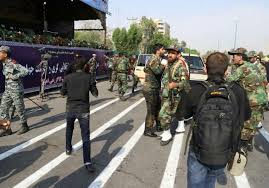
RNA - The dead and wounded were both military personnel and civilians, including women and children and one journalist, all watching the parade. Two of the attackers were gunned down during clashes with the security forces and one other died in hospital. The last terrorist has also been captured.
According to Fars News Agancy, the foreign-backed terrorist groups of Al-Ahvazieh claimed responsibility for the attack. Al-Ahvazieh is supported by Saudi Arabia and the United States, with very intimate ties to the Mojahedin-e Khalq Organization (MKO also known as MEK, PMOI, NCR or NCRI), a hated and exiled terrorist group that has killed thousands of Iranian civilians and officials in the past four decades.
On Saturday, Yaghub Hur Totsari, spokesman for one of the two groups that identify themselves as the Arab Struggle Movement for the Liberation of Ahvaz, said the Ahvaz National Resistance, an umbrella organization of all armed movements takes responsibility. On balance, this adds a huge dimension to the terror attack:
A) Long before the attacks, the United States, Saudi Arabia and their regional allies had already threatened that they would take the war and the unrest “inside Iran” this Summer. This is an open threat of war against a nation who has not invaded or occupied Saudi Arabia or any other Arab littoral state in the Persian Gulf. Meaning, it is wrong for Iran to take the threats of the United States and Saudi Arabia lightly.
B) Iran is an important member of the Syrian led anti-terrorist coalition and is a party to the Astana Peace talks. The Syrian Safe-Zone Memorandum that has also been endorsed by Iran, has been praised by the United Nations. It also helped designate the Idlib province (the last terror bastion) a de-escalation zone. By contrast, Saudi Arabia is one of the world’s biggest state sponsors of terrorism. Saudi Arabia is directly responsible for the funding of Al-Qaeda and ISIL in Syria. Iran is the staunch opponent of these terrorist groups both on the battlefield and in terms of ideology.
C) Saudi Arabia claims it has stopped giving aid to terrorist groups under US pressure, and it has also backed off its support of “moderate” terrorists inside Syria. The truth is, private donations from Saudi Arabia and the Persian Gulf Arab states have continued apace. This includes aiding and abetting the Al-Ahvazieh terrorist group inside Iran.
D) It is the firm belief of many pundits in the West that the United States wages war on ISIL while arming Al-Qaeda in Syria and forgetting that the House of Saud relies on an alliance with a depraved ideology that produces, legitimizes, spreads, preaches and defends Wahhabism and Salafism that ISIL and Al-Qaeda feed on.
E) Saudi Arabia’s so-called “tough stance on terrorism” sits uneasily with its reputation. The homeland of Osama bin Laden (Al-Qaeda) and Wahhabism (ISIL), struggles to counter the widely-held belief that it is an incubator and exporter of murderous fanaticism. Al-Ahvazieh is proved to have conducted the attack, but short after Al-Ahvazieh, the ISIL also sought to gather some reputation by claiming responsibility for the Ahvaz attack displaying once again that both are based on the Salafi-Takfiri doctrine of excommunication that justifies the slaughter of civilians, a doctrine that derives only from the Wahhabi Saudi Arabia. Yet, once the whole world rushed to condemn the Saturday attack as a terrorist action, Riyadh and Washington are now trying hard to derail the public opinion and project the blame on ISIL specially after their ties with Al-Ahvazieh surfaced the media. But evidence and proof are so corroborative and so plentiful that even those who are complete strangers to the Middle-East politics can see very readily that the attack has been done by al-Ahvazieh and at the order of Saudi Arabia and Washington and their latest diversion to shift the blame on others would bring them no success.
F) No doubt substantial and sustained funding from the regime in Saudi Arabia, to which the world has turned a blind eye, played a central role in the terror attack in Ahvaz. Such things simply do not happen spontaneously. Riyadh has long been funding, training and arming various terrorist groups against Iran, including the MKO, armed Kurdish groups, Jundollah and Jeish al-Adl.
G) Saudi use of terrorism has long been viewed as an effective way of blocking Iran’s influence in the region. From this perspective, Riyadh never misses any opportunity to strike at Iran. Saudi Arabia’s failed wars on Syria, Iraq and Yemen, as well as the inability of its American masters to complete the “Hot Summer Project” in Iran, has left them feeling profoundly frustrated and vulnerable. This combination of desperation and vulnerability has made for erratic foreign policy - especially with aggressive new leaderships in Riyadh and Washington eager to support terrorism - to make their marks within Iran.
Altogether, the terrorist attack in Ahvaz did dramatically undercut the silly attempts by the House of Saudi, the Trump White House and Tel Aviv to present Iran as the main cause of regional terrorism and instability during this week’s General Assembly meeting at the United Nations, as opposed to one of many UN member states being a victim and fighting against it.
As maintained by Supreme Leader Ayatollah Seyed Ali Khamenei, "Their crime is the continuation of plots (hatched) by the US-led governments in the region who aim to create insecurity in our dear country. The Iranian nation will continue down their honorable path and will overcome all hostilities like in the past."
847/940